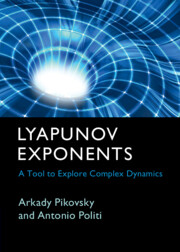Book contents
- Frontmatter
- Contents
- Preface
- 1 Introduction
- 2 The basics
- 3 Numerical methods
- 4 Lyapunov vectors
- 5 Fluctuations, finite-time and generalised exponents
- 6 Dimensions and dynamical entropies
- 7 Finite-amplitude exponents
- 8 Random systems
- 9 Coupled systems
- 10 High-dimensional systems: general
- 11 High-dimensional systems: Lyapunov vectors and finite-size effects
- 12 Applications
- Appendix A Reference models
- Appendix B Pseudocodes
- Appendix C Random matrices: some general formulas
- Appendix D Symbolic encoding
- Bibliography
- Index
5 - Fluctuations, finite-time and generalised exponents
Published online by Cambridge University Press: 05 February 2016
- Frontmatter
- Contents
- Preface
- 1 Introduction
- 2 The basics
- 3 Numerical methods
- 4 Lyapunov vectors
- 5 Fluctuations, finite-time and generalised exponents
- 6 Dimensions and dynamical entropies
- 7 Finite-amplitude exponents
- 8 Random systems
- 9 Coupled systems
- 10 High-dimensional systems: general
- 11 High-dimensional systems: Lyapunov vectors and finite-size effects
- 12 Applications
- Appendix A Reference models
- Appendix B Pseudocodes
- Appendix C Random matrices: some general formulas
- Appendix D Symbolic encoding
- Bibliography
- Index
Summary
In this chapter we revisit the concept of LE introduced in Chapter 3, starting from the definition of finite-time Lyapunov exponents. Any average performed over a finite time is not a well-defined quantity per se since it is typically affected by fluctuations. In the long-time limit, however, it turns out that the residual fluctuations, rather than representing an obstacle for an accurate estimate of the LEs, offer the opportunity to extract useful information on the degree of homogeneity of the instabilities in phase space. Such information can be properly encoded into suitable dynamical invariants, either in the form of generalised Lyapunov exponents or as a large deviation function.
Finite-time Lyapunov exponents can be used to introduce further numerical tools as well as powerful techniques for the evaluation of the LEs. On the numerical side, we briefly review some quick methods suitable for a qualitative assessment of the presence of instabilities, and then we present an advanced Monte Carlo technique to quantify large deviations. On the theoretical side, on combining the concept of generalised LEs with the ensemble-average approach introduced in Chapter 3, we show that the problem of evaluating the largest LE can be reduced to that of determining the largest eigenvalue of a suitable evolution operator. We thereby illustrate the potentiality and difficulties of the various methods with the help of some simple examples. Another theoretical approach, based on the stability of the periodic orbits embedded in a chaotic attractor, is also discussed.
The last part of this chapter is devoted to the discussion of several examples of fluctuations that may emerge in generic dynamical systems. This includes the relationship between fluctuations and deviations from hyperbolic behaviour (the Henon map being a rather instructive reference model) and several borderline cases, where the maximal LE may be equal to zero (weak chaos) or even negative (mixed dynamics), and yet positive fluctuations are generated and induce some form of irregularity in the resulting dynamics.
Finite-time analysis
There are different ways of defining finite-time Lyapunov exponents. We start with a definition that is naturally associated with the concept of covariant Lyapunov vectors.
- Type
- Chapter
- Information
- Lyapunov ExponentsA Tool to Explore Complex Dynamics, pp. 70 - 99Publisher: Cambridge University PressPrint publication year: 2016



